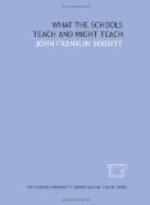7. In Cleveland, where there has been an almost unequalled amount of civic discussion and progressive human-welfare effort, the teaching of civics in the public schools receives too little attention. It is recommended that the principals and teachers make such a civic survey as that made in Cincinnati as the method of discovering the topics that should enter into a grammar-grade course. Not much civics teaching should be attempted in the intermediate grades, but it should be given in the higher grades.
8. A new course of study in geography is now being put into use. The work as laid out in the old manual and as seen in the classrooms has been forbiddingly formal. It has mainly consisted of the teacher assigning to the pupils a certain number of paragraphs or pages in the textbook as the next lesson, and then questioning them next day to ascertain how much of this printed material they have remembered and how well. The new course of study recognizes, on the contrary, that the proper end of geographical teaching is rather to stimulate and guide the children toward an inquiring interest as to how the world is made, and the skies above, and the waters round about, and the conditions of nature that limit and determine in a measure the development of mankind. To attain this ideal will require in every school 10 times as adequate provision of geographical reading and geographical material as is now found in the best equipped school.
9. Drawing and applied art have been taught in Cleveland since 1849. The object of the teaching is to develop an understanding and appreciation of the principles of graphic art and ability to use these principles in practical applications. Where this work is done best, it shows, in both the elementary and high schools, balanced understanding and complete modernness. What is needed is extension of this best type of work to all parts of the city through specially trained departmental teachers.
10. Where teaching of household arts is at its best in Cleveland, it is of a superior character and should be extended along lines now being followed. Manual training for boys should be extended and broadened with a view to giving the pupils real contact with more types of industry than those represented by the present woodwork.
11. Elementary science finds no place in the course of study of Cleveland. The future citizens of Cleveland will need an understanding of electricity, heat, expansion and contraction of gases and solids, the mechanics of machines, distillations, common chemical reactions, and the multitude of other matters of science met with daily in their activities. The schools should help supply this need.
12. Teaching in matters pertaining to health is assigned little time in the elementary schools, and the time that is assigned to it is frequently given to something else. The subject gets pushed off the program by one of the so-called “essentials.” A course in hygiene should be drawn up, and practical applications of the work should be arranged through having pupils look after the sanitary conditions of rooms and grounds. The school doctors and nurses should help in this teaching and practice.




